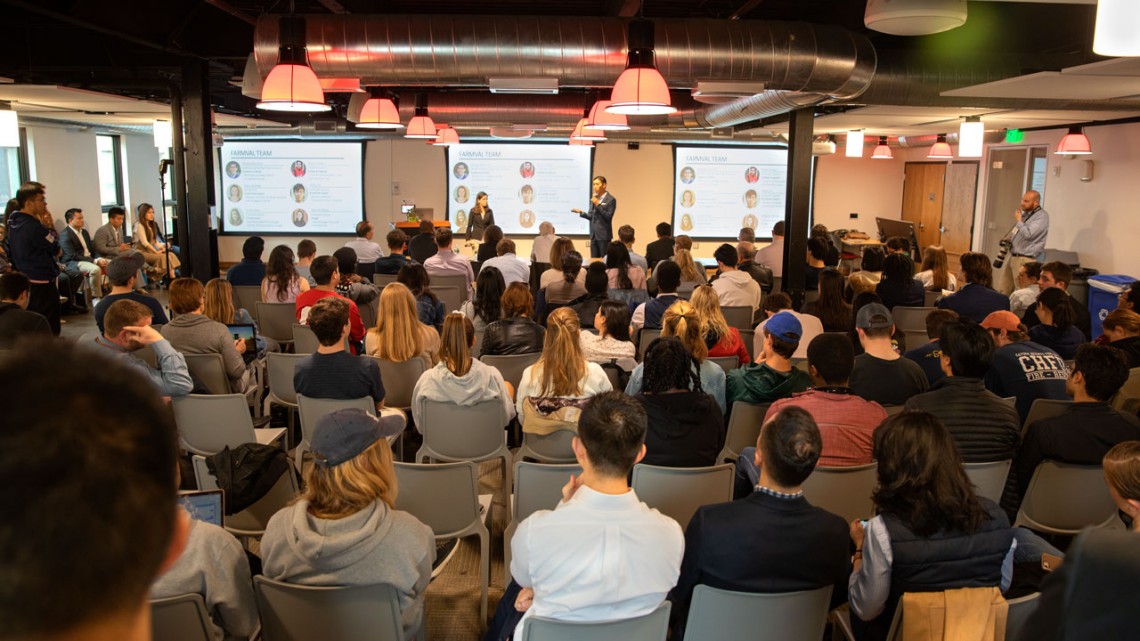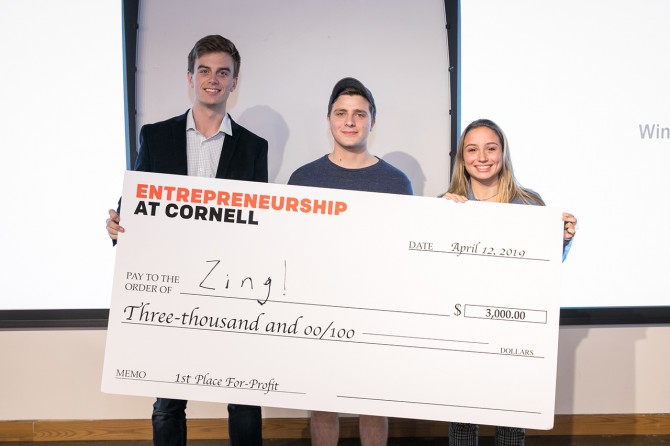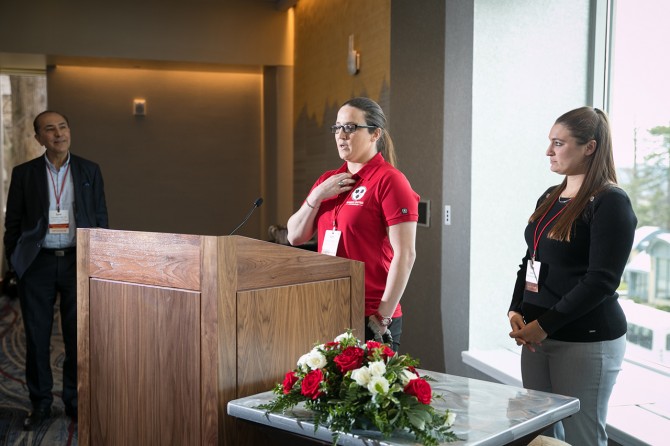
Team FarmVal makes its winning presentation at the Big Idea Competition, April 12 at eHub Collegetown. Graduate student Shiang-Wan Chin, right, and Foteini Kriezi '19 describe the agriculture credit scoring platform, which won first place in the nonprofit/social enterprise category.
Student entrepreneurs face off in business competitions
By Susan Kelley
Many a Cornell student has slogged up Libe Slope or Buffalo Street wishing their walk to campus was a little less steep and a whole lot faster.
A team of undergraduate entrepreneurs has a solution – at least in theory. The group’s business idea is Zing!, a ridesharing service that would get students to campus for just $1 to $2 per ride. Students would order a ride in advance using an app; an algorithm optimizes the routes so drivers fill their cars to capacity.
The creators aren’t the only ones who like the idea: Zing! took first place and $3,000 in the for-profit category of the Big Idea Competition, a business competition for undergraduates, April 12 at eHub Collegetown.
More than 135 students from across the university made 65 pitches; 12 teams made it to the finals. The Big Idea was one of several student business competitions that took place during Entrepreneurship at Cornell’s Celebration event April 11-12.
The annual celebration – which features two days of symposiums, award announcements, competitions and networking opportunities – brings together more than 700 students, alumni, faculty, staff and community participants.
With Zing!, a rate of $1 per ride would earn the company a 25% operating profit margin; a $2 rate would bring in a 62% margin.
“We’re talking about combining all the best features of the current options and negating the worst ones,” said Zing! team member Christophe Gerlach ’20, an applied economics major.
“We can provide the individualized car service of an Uber and get a ride right to the door of your first class in the morning. … And we can improve the timeliness of walking or driving yourself.”
FarmVal took first place and $3,000 in the nonprofit/social enterprise category. Created by Shiang-Wan Chin, a graduate student in systems engineering, and teammates including two undergraduates, FarmVal is the first full-fledged credit scoring platform focused exclusively on agriculture. It offers farmers unique, fair and live credit risk assessment – giving them better access to loans – by applying machine learning to agricultural and financial data.
Funding for the Big Idea Competition prizes was provided by the Vijay (M. Eng ’75) and Sita Vashee Promising Entrepreneur Award Endowment Fund.
Kim DeFiori, MBA ’20, made history twice April 12: She is the co-founder of the first nonprofit to win the Student Business of the Year award and also the first executive MBA student to win the award.
DeFiori graduated from West Point in 2008 and served in the Army’s military police force for nine years, including a deployment to Afghanistan. Her experience with post-traumatic stress disorder prompted her to create Badges United Foundation. The nonprofit aims to enhance the well-being of first responders – who are more likely to die from suicide than in the line of duty – by hosting free recreational events such as hiking and kayaking, where certified coaches teach them about wellness.
“We teach them how to sleep better, exercise and eat a little better,” DeFiori said. “The hope is they gain some knowledge to develop their wellness, but they also network with other first responders. … We want to make sure that our local heroes are taken care of.”
The BenDaniel Venture Challenge drew pitches from 67 teams; six startups made it to the April 11 finals. Taking first place and $25,000 was One Three Biotech, founded by Neel Madhukar, a doctoral candidate in computational biology.
The company’s drug discovery software platform, which uses artificial intelligence, enables pharmaceutical companies and researchers to match potential new drugs to disease targets. It has the potential to reduce this phase of the drug discovery process from approximately four years to three months.
During Demo Day April 11, 14 teams from eLab shared their next steps after working intensely for a year on their businesses. A program of the Student Agencies Foundation and Entrepreneurship at Cornell, eLab is a business accelerator for students, offering weekly classes, mentorship, legal help, a $5,000 investment, co-working space and other services for entrepreneurs.
Each team’s presentation was introduced by a promotional video before team members took the stage at the Statler Auditorium.
Kyle Johnson, MBA ’19, and Sam Leyens, MBA ’19, shared their idea for Incite, a company that compiles and analyzes patients’ health data to help doctors, nurses and other care providers make better decisions about care and interventions.
Evan Turner ’19, Skye Richardson ’19, Barron DuBois ’20 and Constantin Miranda ’20 spent the year working on Noozit!, which provides readers with a cost-effective way to read news from multiple publishers. It allows readers to pay per article rather than having to subscribe to each outlet.
“In an era so clearly plagued by yellow journalism,” Turner said, “it is more vital than ever to provide readers with credible content.”
Media Contact
Get Cornell news delivered right to your inbox.
Subscribe


